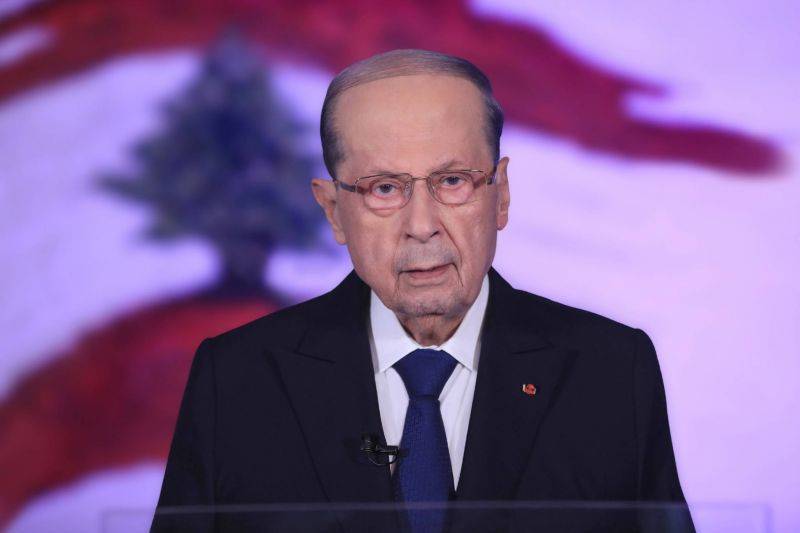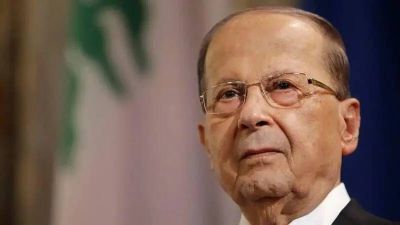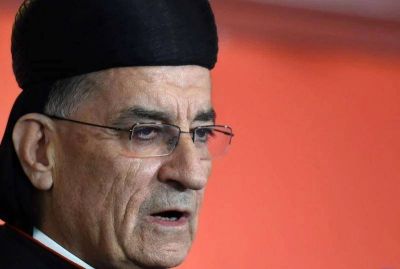
Lebanese Head of State Michel Aoun at the presidential palace in Baabda, November 21, 2021. (Photo credit: Dalati and Nohra/File)
BEIRUT — “I will leave Baabda if the situation is normal and nobody means any ill will,” President Michel Aoun said in an interview published on Tuesday by Lebanese daily al-Akhbar. The statement once again instills doubt about Aoun’s upcoming departure from Baabda, a little more than a month before the end of his mandate.
The head of state said he feared a “plot” against him, for which “maneuvers have already begun.” He did not detail what such a plot might entail.
The election period for a new Lebanese president started on Sept. 1. Parliament Speaker Nabih Berri has yet to convene his fellow MPs to commence the election, sparking fears of a potential presidential vacancy as the caretaker government of Najib Mikati continues managing affairs without a new cabinet since May 22.
Aoun also commented, once again, on the tension between him and Mikati over the formation of a new cabinet. A caretaker government “cannot assume the prerogatives of the President of the Republic” he said, accusing Mikati of “lack of transparency” during their various talks on this issue, according to Tuesday’s interview.
‘I will not stand idly by’
The president has been going back and forth in recent weeks about his intentions to leave Baabda at the end of his term on Oct. 31. Though frequently stating that he will leave the presidential palace in due course, he often tempers his words by adding certain conditions. Such was the case again in Tuesday’s al-Akhbar interview: “I hope that on Oct. 31 everything is normal so that I can go home reassured.” When asked if he had any doubts this will be the case, Aoun said: “Of course I do.”
“I will leave Baabda if the situation is normal and nobody wants to hurt me. If I feel that a conspiracy is taking place, and I will not stand idly by,” added Aoun, who said he would make “every effort” to ensure that a new president is elected within the constitutional deadline.
“I hope to hand over the presidency to my successor, whom [Parliament members] are currently choosing,” he said. Meanwhile, discussions between various parliamentary blocs are in full swing to try to agree on candidates.
A total executive vacancy?
“If there is a vacancy, it is obviously not me who is responsible,” Aoun also said. “Parliament is — the actual responsibility lies with whoever is behind the obstruction of the parliamentary session” in which MPs must elect the next president, he added.
“My decision is known: to leave the presidency at the end of my term. But beware. The conspiracy maneuvers have already begun and will be even more serious after the end of the constitutional deadline and the presidential vacancy,” Aoun told al-Akhbar.
If no successor is found, Lebanon could find itself, for the first time in its history, amid a total vacancy in the executive branch, without a president or new cabinet. On Sunday evening, the head of the Maronite Church, Bechara al-Rai, called on Aoun to leave Baabda at the end of his term.
'I don't mind not seeing him anymore’
Aoun also brought up the other thorny political issue of the moment: the formation of a new government. He said he preferred that “six political ministers of state” be added to the caretaker cabinet. “We don’t know how long the political vacuum can last, and without an agreement on a new government, we won’t get anywhere. But the basis of an agreement is its balance, and we are not there yet,” he added.
With Aoun and Mikati accusing each other of preventing the formation of a government, the former reiterated his criticism of the caretaker prime minister: “Unfortunately, our meetings lack transparency... I am still ready for an agreement with him — if he wants it — according to criteria shared between him and me for the formation of a government.”
Aoun added: “It is not up to [Mikati] alone to form [the government]. He knows well what the constitution says about his and my prerogatives. It is not for me to impose conditions on him.” However, he said, “as long as there is no agreement with the caretaker prime minister, I do not mind not seeing him anymore.”
Aoun also reiterated that a caretaker government “cannot assume the prerogatives” of the president. “This is not only a violation of the constitution, but it also exposes us to a real national crisis that can flare up,” he said.
“If the government remains in its current state, which many people want, it means that we are facing a conspiracy. I am afraid that this one is prepared for the last day of my mandate, Oct. 31, a plot comparable to the overthrow of the state, the presidency and the constitution,” he continued, without adding further details.
These statements are likely to provoke reactions from the president’s critics, who regularly accuse him of wanting to hang onto his seat.
In 1988, under the mandate of President Amine Gemayel, Aoun — at the time commander-in-chief of the army — was appointed to head a transitional military government responsible for electing the next head of state. However, Aoun refrained from organizing the election and had to leave Baabda Palace after an offensive led by Syrian forces on Oct. 13, 1990.
What is Mikati saying?
The caretaker prime minister was quick in responding to Aoun’s statements to al-Akhbar.
“We are continuing all our efforts to form a new government, and on the other hand, these efforts must be followed by all the leaders,” Mikati said in an official statement Tuesday morning.
At a meeting Tuesday in the Grand Serail, Mikati called for a halt to “setting conditions and obstacles in a clear attempt to gain unacceptable political benefits.”
“We must all help each other to settle the government file and contribute to strengthening political stability, avoiding sterile and pointless polemics,” he continued.

